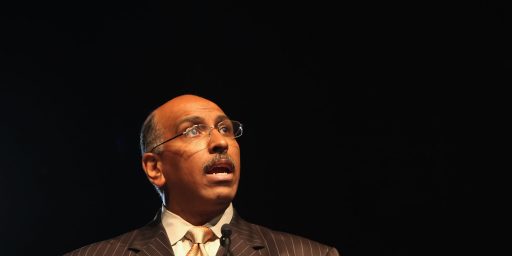DUBOIS V. WASHINGTON
Shelby Steele has an interesting WSJ editiorial reflecting on the 100th anniversary of WEB DuBois’ masterwork The Souls of Black Folk. Steele believes it should be read as a cautionary tale in light of today’s continuing racial struggles:
This new 21st-century racial problem might be called the problem of emergence–the shock that formerly oppressed people experience when they first emerge into new freedom, and the struggle with responsibility that always follows. In freedom their underdevelopment looks precisely like the inferiority their oppressor had always accused them of, because now it no longer has the excuse of oppression. Under this threat of humiliation, the newly free will have to decide who should be responsible for their development. And the society that oppressed them will also have to decide. All discussions of race in America today are discussions of responsibility.
So the first phase of emergence is rarely a wholehearted embrace of freedom but rather a resurrection of the enemy just defeated. For blacks the old enemy of racism mutes the humiliation of new freedom by absorbing blame for inferiority. “I can’t because of racism.” Perhaps the most pernicious feature of real oppression is that it is always, in itself, an argument that others should be responsible. So when it ends, a new and kinder dependency will look like justice. This is why the dream of freedom for many oppressed peoples is a socialistic “promised land,” not really a dream of freedom at all. When you are oppressed, you tend to believe in the power that oppresses you. You only want it to make your life prosperous rather than wretched.
Steele contends that DuBois, by chosing to blame the plight of blacks on white oppression–while certainly reasonable given that slavery had only recently been abolished–was ultimately wrongheaded.
Its ambition was oppression, not freedom. *** The most famous idea in “Souls” is what DuBois called double consciousness, “this sense of always looking at one’s self through the eyes of others, of measuring one’s soul by the tape of a world that looks on in amused contempt and pity.”
In contrast,
The man DuBois attacked most fiercely in “Souls” was Booker T. Washington, the great accommodationist who believed blacks should develop in the trades, practice entrepreneurialism, and win admiration through the achievement of excellence. This outraged a protester like DuBois, who believed black dignity had to be a given under the law. Washington, he said, was allowing whites to “shift the burden of the Negro problem to the Negro’s shoulders . . . when in fact the burden belongs to the nation.” But Washington believed black dignity was an outgrowth of achievement, ownership and success in commerce despite the restrictions of Jim Crow. He believed, in effect, that emergence and the self-development it required were not tied to a civil-rights kind of freedom. To read his “Up From Slavery,” published three years before “Souls,” is to encounter a true understanding of slavery’s human desolation, and to learn how simple achievements compiled over time, and through the mastery of ever more complex skills, could transform the slave into a responsible citizen.
His genius was not to give away responsibility, not to let others carry the burden of one’s uplift. Responsibility, he knew, was the transformative agent, the only power that could change a slave into an individual who could know himself as the true equal of others. Washington did not deny black inferiority; he started his work there.
Very interesting indeed. Go read the whole thing.
(Hat tip: Stephen Green)






Just before the latest war in Iraq started, I was having a conversation with a recent immigrant from Russia. I stated my belief that people want and need freedom. She corrected me.
She said it was much more simple. She just wanted to live a nice life without fear. This attitude is why Socialism is attractive. Freedom requires that you shoulder responsibility. That is very scary to someone who has always had someone else be responsible, even when that someone else was oppressive. Abdication of personal responsibility for your own life is a recipe for oppression.
—